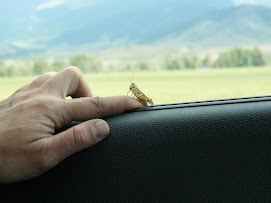Maggie, having already invited several Serbian friends over for a gingerbread house making party, needs to find molasses to make said gingerbread. She goes to the biggest grocery store she knows, the one where she can find fresh ginger and mangoes, and has this conversation (in Serbian):
Maggie: Hello, I have a question.
Store clerk: OK, go ahead.
M: OK. I need to buy something, but I don't know if you have it, and I don't know how to say it in Serbian.
SC: OK... well, what is it?
M: I don't know. In English we call it molasses.
SC: I don't know what that is. What's it like?
M: It's like honey, but it's black.
SC: Black honey? We have that.
M: No, it's not honey. But it's LIKE honey. But it's not honey. It's black and sweet and... like honey. You cook with it. You can't eat it. I mean, you can eat it, but you can't eat it alone. I mean, you can, but that is gross.
SC: ...OK. Follow me. (Shows Maggie to the honey shelf. Hands her a jar of black honey).
M: This is honey.
SC: Yes, this is black honey.
M: No, what I want is not honey. But it is like honey (wishes desperately that she knew the word for "sticky" or "thick").
SC: I don't think we have what you want.
M: OK. Thanks anyway. (walks away, and accepts defeat).
Not all is lost, however. I free-hand cut house pieces from sugar cookie dough, baked those, and we put them together with homemade butter cream frosting. It worked pretty well!
The materials....

The process...


The finished products!

My friends had never made cookie houses before and were eager to try. They kept asking at what point we eat them... I think the concept of cookies just for decoration is pretty American (both showy AND wasteful! Yay!)
Otherwise, though, the winter has been progressing nicely, and by "nicely" I mean with a shit ton of snow, and then a warm front to melt it all. We did have fun with the kids at work in the snow, though, while it was here.
In conclusion, here are a few more examples of me making an ass out of myself in a foreign language (since apparently these are popular).
Buying cheese in the market:
Cheese guy: Would you like to buy some of this cheese, too? It's very good.
Maggie: No thanks, it's my first time.
Cheese guy: (concerned face) OK... well... enjoy....
(I mixed up "first time" and "another time". Earlier that day I had told someone that it was my first time in Europe, and apparently I can only use one phrase a day.)
While sitting (alone) at a bus station waiting to be picked up by friends for the weekend:
Stranger: Miss, do you need some help?
Maggie: No, thanks, I'm waiting with friends.
Stranger: (looks around deserted bus station) OK....
(za prijatelje (for friends) vs. sa prijateljima (with friends)... I guess I need to study the cases again).
At home, listening to music:
Friend: Is this on youtube or do you have it on your computer?
Maggie: It's mine. I bought this song because I love you.
*crickets chirping*
Maggie: OH! OH! I mean, I bought this song because I love IT! I mean, I like you, but, this song... I.... um....

